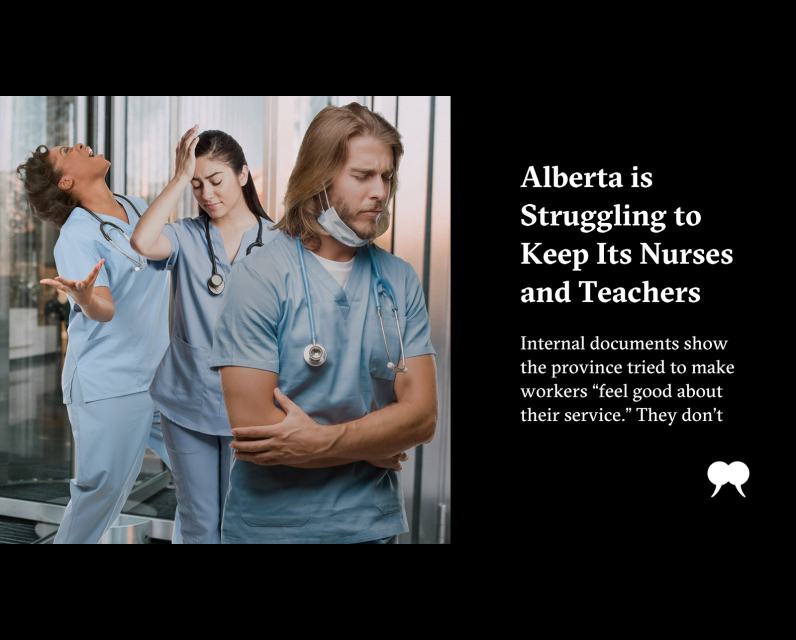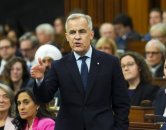Source Feed: Walrus
Author: Kena Shah
Publication Date: June 9, 2025 - 06:30
Alberta Is Struggling to Keep Its Nurses and Teachers
June 9, 2025

Lower taxes, better income, more take-home pay, billions in health care, and education investment: these are the promises made in the recent Government of Alberta advertising campaign to encourage workers to move to the province.
After the success of the 2022 Alberta Is Calling campaign, which attracted thousands of interprovincial migrants to Alberta, the province ran a new campaign, called Better Here, late last year. This time, the government hoped to woo public sector workers from other provinces, implying that they would make more money if they moved. But Albertan nurses, paramedics, and teachers say that these opportunities simply don’t exist. They say they’ve been advocating for higher pay, better working conditions, and more staff for years.
The campaign, which ran from November to December 2024 on Facebook and Instagram, cost at least $42,000. (This amount does not include ad spending on platforms such as X and broadcast channels.) According to public documents and emails, obtained through an Access to Information request, one of the campaign’s goals was to “make people who work in these sectors feel good about their service to Albertans.”
“These ads started coming out right after we completed our rally for respect at the legislature,” says Mike Parker, a paramedic and president of the Health Sciences Association of Alberta (HSAA), a union representing health care professionals in Alberta. Last year, members of multiple public sector unions gathered to demand higher compensation and more funding for public services. The United Nurses Association, for example, has seen five years of wage freezes and says the current salaries have not kept up with inflation.
This rally wasn’t an isolated incident; the past year was marked by a number of demonstrations across the province, with other public sector workers demanding increased wages in the face of inflation. On February 28, 2024, CBC Edmonton reported that 248,000 public workers’ contracts would end that year. In that same article, Jason Foster, an associate professor of human resources and labour relations at Athabasca University, predicted that there was going to be a “very confrontational and difficult round of bargaining.”
When the 2024 provincial budget was released a day later, unions voiced concerns that it would not offer fair wages for public sector workers. They also argued that education was not being adequately funded: schools in Alberta have seen rising enrolment, and many are past capacity. At an Edmonton Public School Board meeting, administrators said that if schools continued to take on students at the same rate, they may have to convert spaces used for specialized programming, like music or art, into regular classrooms.
“Alberta is the least funded school jurisdiction in all of Canada,” says Jason Schilling, president of the Alberta Teachers’ Association. Schilling explains that while the 2024 budget saw a 4.4 percent increase in money that goes toward supporting students, he estimates that a total increase of 13.5 percent is needed just to reach the Canadian average of spending per student. The 2025 budget does not cover this gap either. “We have students in our classrooms that are overcrowded. We have students in our classrooms who don’t have the resources that they need to meet their educational needs. We are not able to meet the demands of special-needs students.” (The premier’s office, as well as the health and education ministries, did not respond to requests for comment.)
Schilling says the Better Here campaign is misleading, because while Alberta does have a shortage of teachers, simply trying to recruit people to come work in the province while doing almost nothing to retain them isn’t the solution. “My colleagues are leaving their jobs at schools because of class sizes, pressures with resources, and feeling burnt out,” he says.
The government tried to address the teacher shortage in 2023. Premier Danielle Smith asked the education minister to create a teaching certificate that would fast-track people into teaching positions in junior high and high schools. But Schilling says that won’t help either. “If you reduce the credentialing [needed] to become a teacher, those teachers won’t be prepared well enough to handle the complex pressures that are in our classrooms right now, and they’ll leave as well. So you end up creating a revolving door of teachers in and out of schools,” he says.
Compensation is central to the Better Here campaign. But public records containing wage comparisons shared in emails obtained by The Walrus show that while Alberta has lower taxes, the before- and after-tax salaries in Alberta, British Columbia, Saskatchewan, Manitoba, and Ontario aren’t very different. For secondary school teachers, Alberta’s before-tax pay is the lowest, but after-tax pay is still on a par with other provinces. The before-tax salary for registered nurses is lowest in Alberta, and their after-tax pay remains lower than in BC and Saskatchewan.
Just as for teachers, recruitment and retention are also a concern for health care roles in Alberta. Data from the Canadian Institute for Health Information between 2018 and 2022 shows that while Alberta has had a slight increase in the inflow of nurses, almost just as many nurses are leaving the province. Ontario and BC both have a higher rate of retention for nurses.
In one Better Here video, a nurse is shown relaxing presumably in her backyard, after which the scene changes to show her working a shift, implying that her job is able to afford her a comfortable life. But up until recently, nurses in the province have had their wages frozen for five years. Emergency medical service workers, such as paramedics, have much of the same asks as nurses as they undergo bargaining through HSAA. According to a CTV News report, Alberta Health Services (AHS) has so far offered only a 7.5 percent wage increase over four years and a lump-sum payment to around a fifth of HSAA members—which the HSAA says amounts to a wage freeze.
In November 2023, Alberta announced an overhaul of AHS, which involved breaking up the central health care service into four agencies: primary care, acute care, continuing care, and mental health and addiction. While the United Conservative government has said that the goal of this restructuring is to improve access and reduce wait times for patients, health care workers have spoken out about the misplaced focus on restructuring rather than on addressing staff shortages, the lack of family physicians, and facilities to support patients. Some unions, such as HSAA, are finding out about ongoing transitions and staff transfers only through news releases, says Parker.
As with teachers, health care workers in Alberta are also feeling burned out while fighting for wage increases. And yet, Parker says, the Better Here ads seem to promise “that all of the issues with understaffing, with underfunding, with the chaos of this [AHS transition] is not real and that they actually have it the best that there is.”The post Alberta Is Struggling to Keep Its Nurses and Teachers first appeared on The Walrus.
OTTAWA — The mayor of northern British Columbia’s busiest port city says he’s following Premier David Eby’s lead in taking a wait-and-see approach to rebooting the cancelled Northern Gateway Pipeline project.
Prince Rupert Mayor Herb Pond told the National Post on Friday that he’s reserving judgment until he sees a new proposal on the table.
“I’m a little bit (more) with Premier Eby… Until there’s a project and a proponent, we’re not going to spend much time on it,” said Pond.
“It’s so hard to have a discussion about an imaginary project.”
Alberta Premier Danielle Smith has...
June 13, 2025 - 15:55 | Rahim Mohamed | National Post
The Canadian Cancer Society is warning the Carney government about the potential risks to health standards if new interprovincial trade legislation doesn't add new safegaurds.
June 13, 2025 - 15:53 | Globalnews Digital | Global News - Canada
Canada's chief public health officer Dr. Theresa Tam, who became the face of the country's COVID-19 response, is set to leave her role next week.
June 13, 2025 - 15:44 | Sean Previl | Global News - Canada




Comments
Be the first to comment